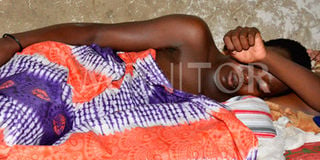Prime
Two casual laborers help woman deliver baby at hospital gate

Mr Anita Mushiwimana pictured lying on the mattress with her baby at her home on Boxing Day. PHOTOS/ PEREZ RUMANZI
What you need to know:
- Mr Sulagi Nkazitunga, a resident however, said the medical officers have been at facility for so long that they have become negligent.
- In July this year, a woman died in labor at the same facility following complications residents say were a result of negligence.
- Uganda suffers a persistently high maternal mortality ratio currently at 336 per 100,000 live births which translates into 16 women dying every day during childbirth.
Ntungamo District officials and police are investigating circumstances under which a 21-year-old mother delivered a baby at Kitwe Health Centre IV gate on Boxing Day after she was allegedly ordered to leave the maternity ward for failing to pay the midwife Shs50,000.
Ms Anita Mushiwimana says she was asked to leave the maternity ward at a round 9pm on Christmas day and go to Itojo hospital, about 50kms away after failing to raise the money the midwife was asking for.
“We arrived at the health facility at around 8pm on Saturday. She told me to leave the maternity ward or I suffer the consequences because I failed to raise the Shs50,000 she wanted. She said I should go to Itojo hospital where I would produce my first child from. I packed all my belongings and started to walk out but could not go beyond the health facility’s gate because the pain was too much. I sat at the gate for hours as my mother held me. I later gave birth with the help of my mother and some two men,” Mushiwimana told Monitor at her home in Kitwe town where we found her lying on a small mattress on the ground with newly-born daughter covered in the same blanket and an old skirt. The two were found lying close to a charcoal stove lit inside the house to keep them warm. A blue tarpaulin covers half of the dusty floor of the room where she normally sleeps with her husband, mother and other two children.
Baby came sooner than expected
Mushiwimana says she had not expected the baby that soon.
“I expected to give birth in the next one week. However, I felt labor pains on Saturday evening,” she says.
At about 8.30pm she moved to Kitwe Health Centre IV which is about 300 meters away from her home.
When they reached the facility, Mushiwimana’s mother, Ms Veneranda Mukaturasinze says the midwife, a one Ms Juliet Uwamurera who was the only medical officer around, said she would not touch her unless they gave her the money she was asking for.
“After about an hour of pleading, we walked out when we realized the midwife was not moved. My daughter was also wincing in pain. At the facility gate, she said she did not have the energy to continue walking. We stayed at the gate until about 2am when the labor pains became too much. She finally gave birth to a baby girl with the help of two casual laborers and myself,” Ms Mukaturasinze narrates.
Laborers call for help using social media
The two men recorded an audio which they later circulated on several WhatsApp groups calling for aid from the district authorities.
In the audio recorded while Ms Mushiwimana was in labor, the laborers are heard explaining what was happening at the health unit’s gate.
After dawn (Sunday morning), a team comprised of the Residents District Commissioner, Mr David Kaboyo, the District Chairman Mr Sam Mucunguzi and the District Police Commander Ms Patience Baganzi stormed the health center with questions about the content of the audio recording.
The team met Ms Umurera and other staff at the health centre.
However, Ms Umurera in her defence said she referred Ms Mushiwimana to another facility after discovering that she had a scar on her belly following a previous surgery.

Ntungamo district leaders visit mothers at Kitwe Health Centre IV on Boxing Day. PHOTO BY PEREZ RUMAN
“I could not risk attending to her. I did not follow her to the gate where she produced from because it was dark and my security was not guaranteed at the time,” she said.
Only midwife at health facility
At the time of Ms Mushiwimana’s incident, Ms Umurera was alone at the health centre attending to about five other mothers with no security guard deployed at the facility.
Describing the incident as unfortunate, the health centre’s in charge, Mr Julius Atwebembire apologized to the mother and her family.
He said the health facility has five midwives who work in shifts, with only one deployed to work at night.
Mr Kaboyo ordered for the arrest of the security guard who was supposed to be on duty at the time of the incident as investigations continue.
“We shall make sure that we investigate this incident to logical conclusion. We are fortunate we are not dealing with death now. That the child and mother survived is just God’s grace, but we can’t let this to continue,” Mr Kaboyo said.
Previous cases
Mr Sulagi Nkazitunga, a resident however, said the medical officers have been at facility for so long that they have become negligent.
“My wife also delivered a baby in this health centre’s compound because I failed to raise Shs50,000 to pay the midwife on duty,” he said.
Last Thursday, another woman is said to have delivered a baby at the gate after she was referred from the health centre. In July this year, a woman died in labor at the same facility following complications residents say were a result of negligence.
However, Kitwe is credited for delivering 150 mothers monthly, one of the highest figures in south western region health facilities.
According to the health unit’s register for admitted mothers, Ms Mushiwimana was the 178th mother in December alone. At least 29 of the mothers who have so far delivered babies at the facility this month alone are teenagers.
Health budget
Kitwe Health Centre IV incident highlights the general challenges faced by Uganda’s healthcare system, especially maternal health.
The Abuja Declaration, to which Uganda is a signatory, provides that governments allocate at least 15 per cent of the annual budget to the health sector.
However, the sector has only been allocated 6.2 per cent of the national budget, which is not even half of what the Abuja Declaration demands.
Uganda suffers a persistently high maternal mortality ratio currently at 336 per 100,000 live births which translates into 16 women dying every day during childbirth.
Lack of basic maternal health commodities such as gloves, syringes, blood and medicines are the major causes of maternal deaths.




